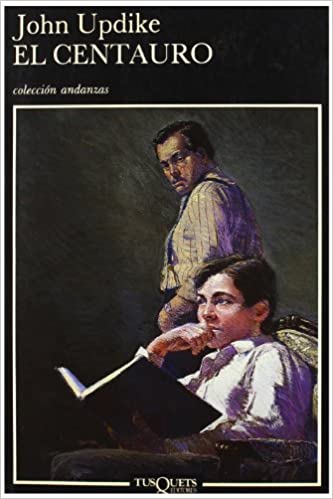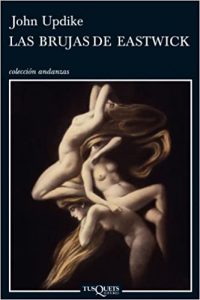To my understanding, realism as a current narrative trend takes on considerable difficulty. Delving into the tangible and the mundane to pick out brilliant narrative aspects is only at the level of those creators who observe the world with a perspective between critical and crippling And yet it ends up being a kind of multifocal genre according to the author (the dirty realism of Bukowski, the social realism of Delibes, the manners realism of Perez Galdos, the existentialist realism of Milan Kundera...) extremely necessary so that literature is also a tool for study and analysis closer to detail than ever achieved by the greatest human or social theories.
John updike was one of those realist writers who embarked on the singular mission of realism as sustenance, filling it with humor, estrangement, nostalgia, social criticism or any other nuance that could serve his cause of the stripping of the human being in terms of their motivations, decisions and interactions.
In his manifest mission to narrate from the everyday, to end up composing brilliant plots in which characters such as Harry Angstrom, also known as a rabbit and recovered cyclically during his bibliography, take the controls of that realism through whose focus we can see in his case the crudest reality in the United States.
But beyond the singular saga, Updike was a prolific author with more than twenty novels behind him. So with due reference to the beginning of his great work on Harry Rabbit Angstrom, we will also talk about other of his novels ...
Top 3 Recommended Books by John Updike
Run rabbit
With the beginning of the Rabbit saga, the author embarked on a gratifying story around Harry Angstrom that would accompany him for decades, publishing new installments every decade, as if the character were feeding on the author's own vital changes.
Undoubtedly a narrative commitment towards the deciphering of a reality subjectively readjusted over the years and that presents a Harry Angstrom at the controls of his decisions and his circumstances that in turn serve the cause of the critical view of the immersed human being in conventions and standards.
The saga would earn the author two pulitzer prizes for the second and third installments. But with the perspective of the work in its general consideration, it seems more relevant to highlight the beginning of the saga, the starting point, the critical moment in which we are told how Harry decides to abandon everything, wife and children included, to give himself to the search for that indecipherable milestone, psychopathic for some, irresponsible for others, of a freedom close to debauchery.
When the rabbit is directly targeted by the shotgun of reality, it ends up taking a jog with which it manages to escape from everything. This is how we discover the world under Harry's new imaginary.
And this is how we walk with a character at times grotesque, at times lucid. A character who, between acid humor, irreverence and the search for "something", manages to transform the details of the routine into surprising new interpretations.

The Centaur
Much of our current wisdom and practically all the human and social avatars of our western society find a reflection in antiquity with special consideration to those allegories that Greek and Roman mythologies suppose, with their gods, their demigods, their heroes and all that series of drives and passions that move the plots of these imperishable works.
So John Updike wanted to accommodate one of these old Greek legends to the current scene. A father can be that Chiron endowed with experience, science and knowledge. And without a doubt, a modern Chiron would want nothing more than to have a son turned Prometheus as a being to whom to transfer all his wisdom to make him an even better man, a hero of our days.
The death that stalked Chiron as soon as he received the arrow of Heracles is something like the pain of the distance between a father and his adolescent son who no longer sees any doctrine in his father.
That kind of mythological relief between the lying Chiron and the Prometheus about to receive immortality as a gift from Chiron acquires a special aftertaste with those shades of descent to reality, to our time ...

The Witches of Eastwick
This novel by John Updick is the weirdness, the quirkiness, the disconcerting tone departure and the demonstration that as an author he could tackle new genres beyond his traditional realism. Many of us still remember the eighties film that simply addressed the aesthetic far above other narrative foundations.
But come on, the movie wasn't bad either. Because while it is true that the knowledge of the esoteric gifts of the three divorced women underlie the plot, we also enjoy in the novel details that make a mockery of social conventions or that delve into the feelings of the failure of that transcendental figure that is the marriage.
The arbitration putting their powers into practice by these women and the arrival of Darryl Van Horne ends up composing a catharsis of magic, humor, criticism and sexuality.

